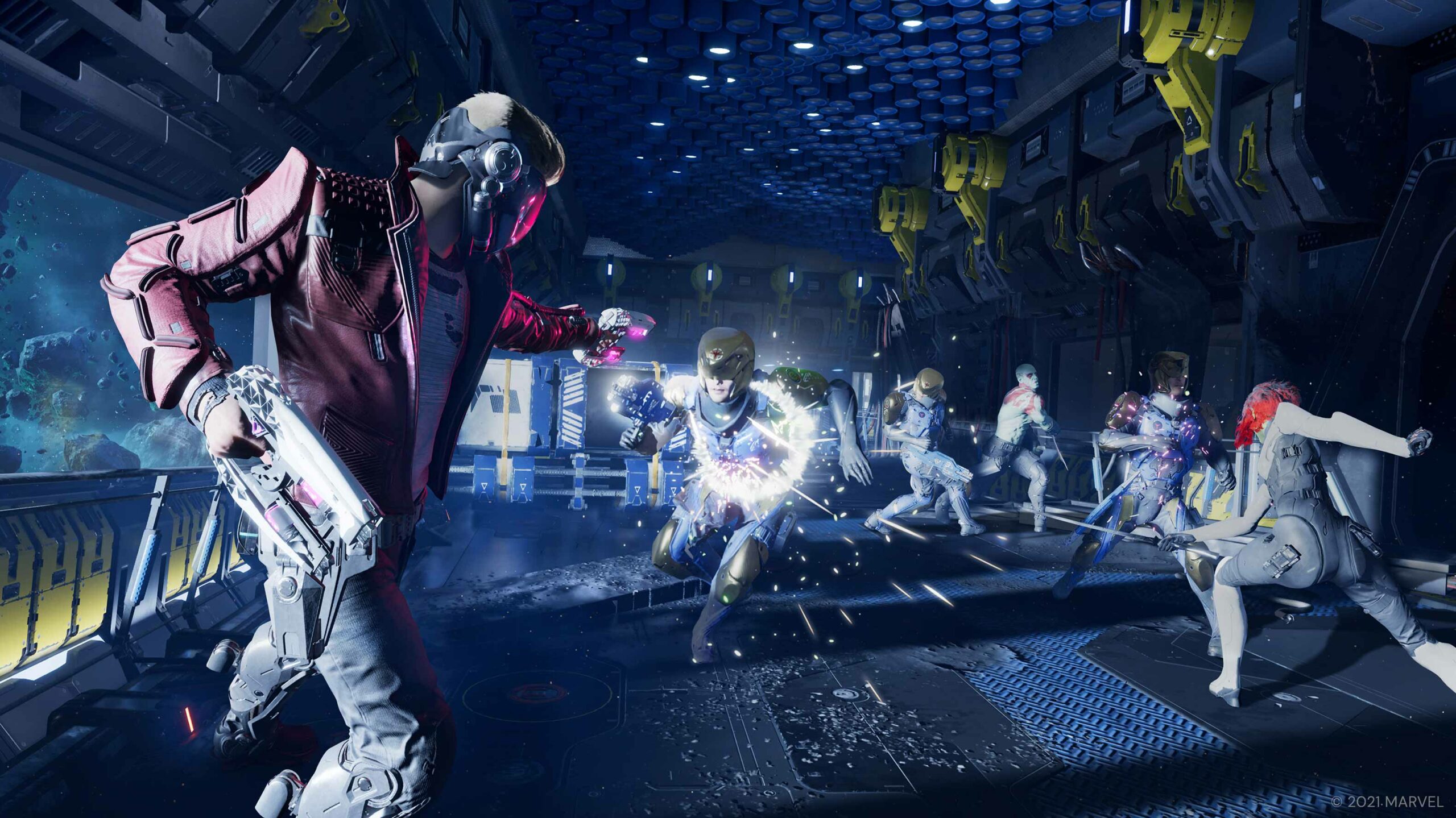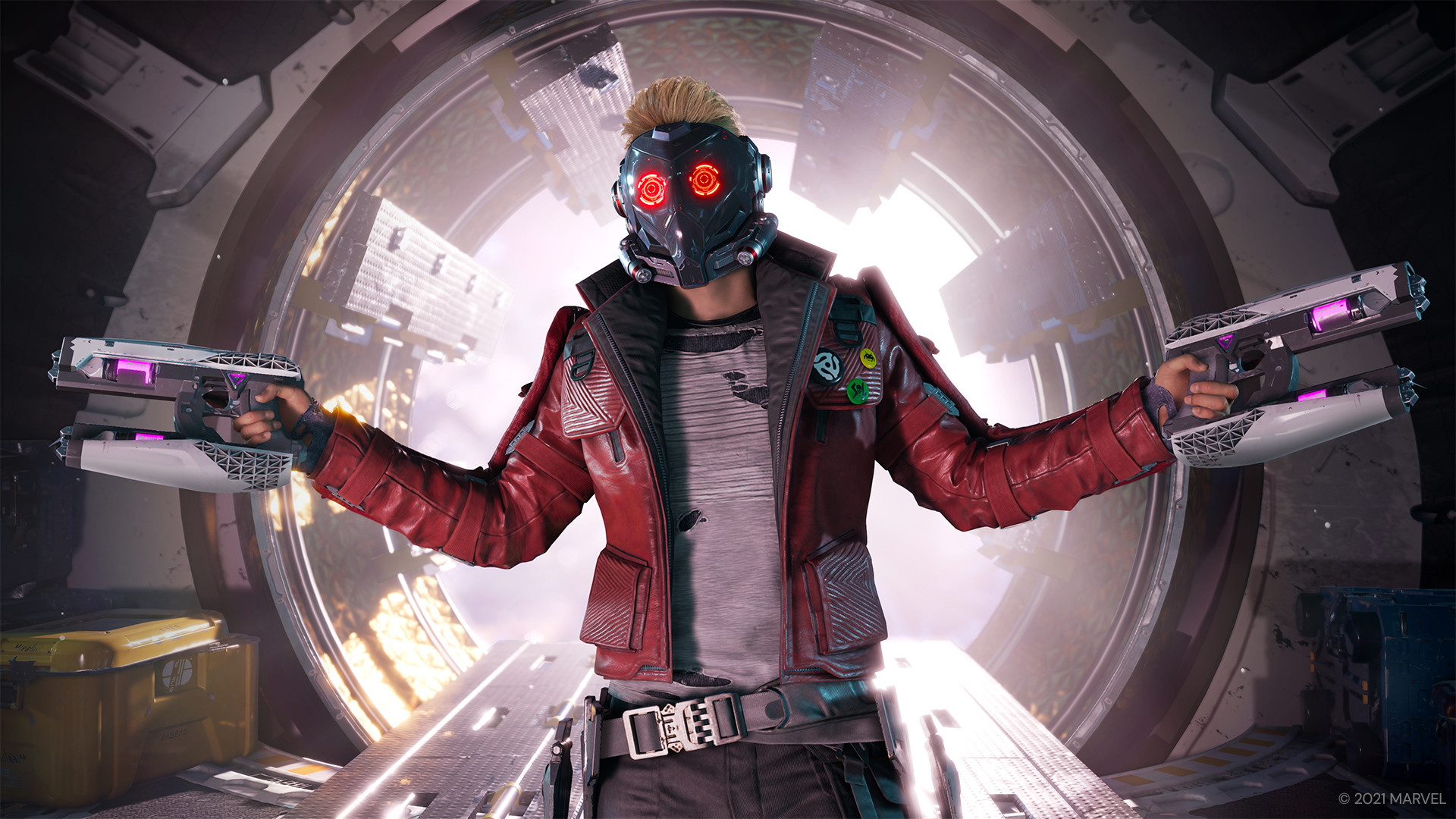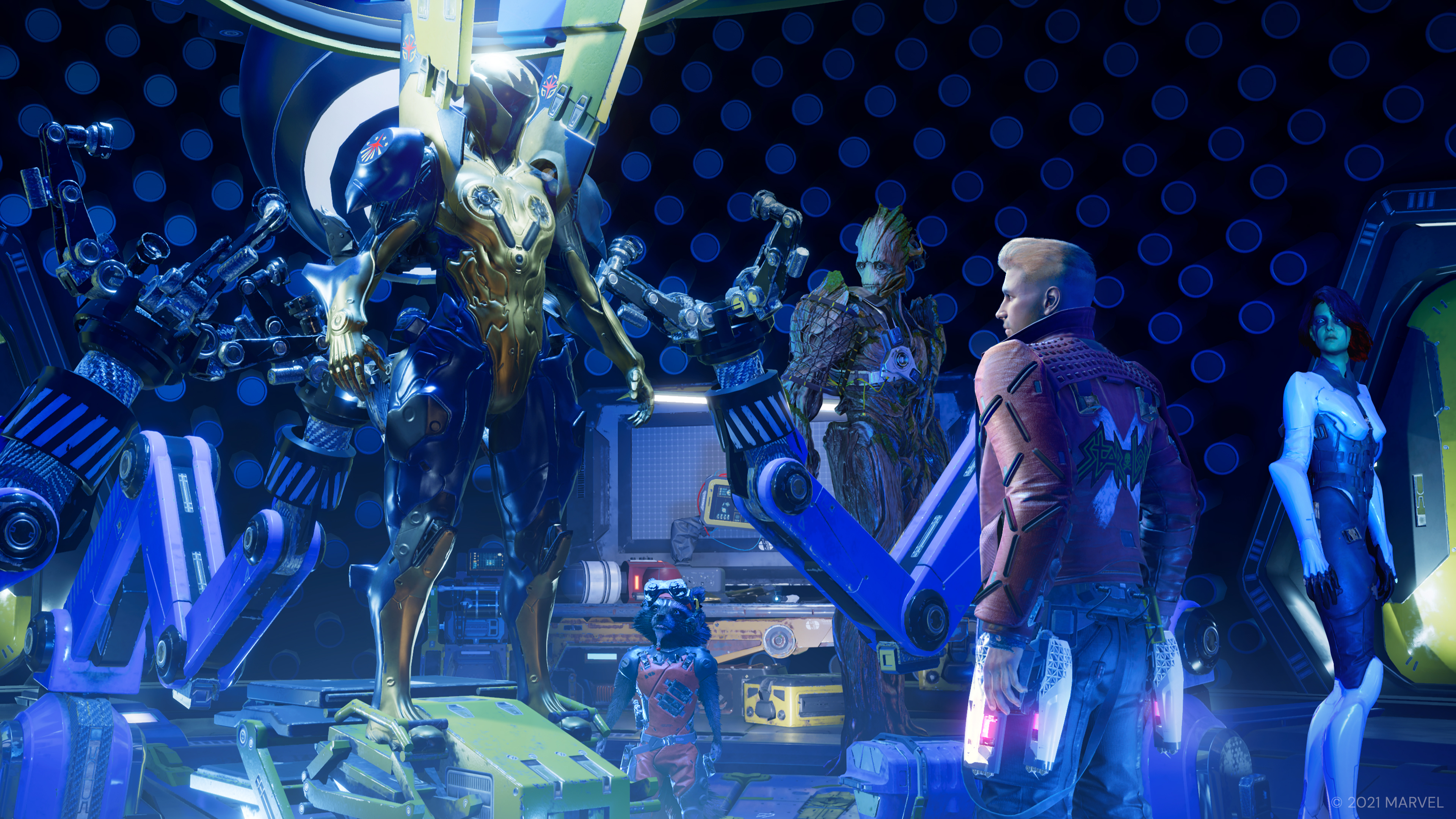
Note: his story contains major spoilers for the two Guardians of the Galaxy films and light spoilers from Eidos Montreal’s game.
One of the recurring talking points I’ve seen regarding Eidos Montreal’s surprisingly great Marvel’s Guardians of the Galaxy game is how it surpasses two films based on the ragtag group of cosmic outlaws. In his review for The Washington Post, Gene Park referred to the game as “an even better Guardians story than the two blockbuster films combined.” GamesRadar‘s Sam Loveridge less definitively said the game “might be better than the movies.”
On the one hand, I understand the necessity of bringing up the films when talking about the game. After all, writer-director James Gunn’s cinematic stamp on the Marvel characters is the main reason why the majority of people are even aware of them to begin with. But I take issue with these persistent arguments about which version of the characters is “better.” That’s because directly comparing a film and game is just a disservice to both mediums — it really is a case of apples to oranges.
There are similarities between both takes on the Guardians, undoubtedly, particularly in their focus on Peter Quill/Star-Lord, Gamora, Drax the Destroyer, Rocket Raccoon and Groot. But there are also countless differences, and it’s through those that both the game and the films prove uniquely successful within the contexts of their own artistic mediums. Gunn’s films successfully condensed decades’ worth of comic material to make obscure characters popular among general audiences. That he did all of this within the increasingly generic Hollywood blockbuster space and the confines of the sprawling Marvel Cinematic Universe makes this feat only more impressive. There wouldn’t even be an Eidos Montreal-made Guardians game without Gunn’s films.
“Impressively, the developer has found a smart middle ground between matching the style and flavour of the films while being more faithful to the source material.”
But beyond all of that, the most obvious difference between the two properties should be length. Simply put, it’s unreasonable to stack up a film — or even two, in this case — to a game. It’s far easier to offer a more well-rounded, in-depth portrayal of five characters in a 20-plus hour experience than it is a two-hour one (or, even, nearly four-and-a-half, if you consider both films). Eidos’ Guardians of the Galaxy‘s length can even be extended by several hours if you decide to do everything it has to offer, which includes going off the beaten path to explore and making different choices in a subsequent playthrough. These are elements that a film simply doesn’t have the time to offer.
But gaming’s unique status as an interactive medium gives it strengths that films can’t be expected to match, and thankfully, Eidos Montreal has made full use of this. Impressively, the developer has found a smart middle ground between matching the style and flavour of the films while being more faithful to the source material. The overall personality of the property — from each individual character to the heavy use of licensed music — is lifted straight from Gunn. It’s also, graciously, made a single-player, microtransaction-free experience, thus avoiding many of the pitfalls of last year’s Avengers game. And it But that’s really just scratching the surface.
The core Guardians story of this dysfunctional found family and the support they give to heal each other’s traumas is much more thoroughly explored in-game. Beyond just getting more time together, the ways in which they interact greatly enhance their relationships. When my Quill is about to fall his death, it means so much more for Gamora to come swooping in for a heroic save than it would be to see Zoe Saldana’s Gamora do that for Chris Pratt’s Quill. For Drax, we can actually have playable flashbacks where we get to see his long-lost family firsthand, putting a face to his pain in a way the films couldn’t. Groot teaming up with Quill for a flashy takedown in the game’s surprisingly dynamic third-person shooter combat feels incomparably satisfying.
But this is all, perhaps, best exemplified with Rocket, the standout character of both the game and the movies. In the latter half of the game, there’s a section where the team is traversing through a murky cave. You eventually come across a cavern, and the path forward is quite clear — simply walk along this water-soaked pillar to cross to the other side. But Rocket quickly tells you that he can’t do it. The fear in his voice is palpable. The waterfall above the platform terrifies him. While the Guardians are understandably confused, they begrudgingly agree to find him a dry way forward. At this moment, I empathized with Quill. “Why am I doing this tedious environmental puzzle? As Gamora said, why can’t Rocket just ‘suck it up?'”
“This arc feels more impactful than anything a movie could ever do because you helped Rocket get here.”
Of course, I had to suck it up and do as I’m asked so I could progress. But soon after, I’m greeted with a surprisingly touching — and, for the mammalian Guardian, remarkably rare — explanation of the root of his PTSD. This then pays off beautifully later on when Rocket must confront his fears to help you carry onward. After everything we’ve been through, after the many hours of Quill and Rocket being at odds and the latter even storming out of the party at times, he’s willing to risk everything for you.
This arc feels more impactful than anything a movie could ever do because you helped Rocket get here. You weren’t a passive observer in Rocket’s journey — you were an active participant in it. It really can’t be understated how getting to embody a character (in this case, Quill) helps connect you not only to them, but to everything around them, including their friends (in this case, Rocket and the other Guardians).
And these are just the larger story beats. Eidos Montreal’s Guardians of the Galaxy is punctuated with all kinds of small moments that further endear you to the characters. As previously mentioned, the game offers a number of dialogue choices that affect the way conversations and even missions play out. While the overarching story and character journeys remain the same, this gives you a level of personalization to the story not found in the films. When Pratt’s Quill makes a decision that ticks off Rocket, you really can only sit there and observe. But in the game, you have to consider how a) you upset him and b) what that might mean for future interactions and missions.
Even if the options boil down to “this” or “that,” they still offer some level of choice that helps create the illusion of you going on this grand space-faring journey with your friends. That feeling is only enhanced by the downtime you get between missions in the Milano, the Guardian’s ship. The movies understandably couldn’t dedicate much time to this — this wouldn’t exactly be fun to watch — but in a game, it’s necessary to have moments to breathe in between action-packed gameplay sequences.
Here, the game adopts a wonderful Mass Effect-esque structure. You get the freedom to roam the ship, talk to your crew and even play some catchy licensed tunes. These bits also allow Eidos to have fun, long-running gags like a constantly opening fridge door. These scenes are enjoyable and laidback in their own right, but they feel more special because you took the time to find them. With the movies, we may relate to different characters or themes, but the core viewing experience remains virtually identical otherwise. In Eidos Montreal’s Guardians, though, you may have come across bits that I completely missed because you played it differently, or vice-versa, and that’s a sense of discovery that feels personal and rewarding in a way film never could.
The game also wisely makes sure to not wholly retread the films, focusing on a conflict with the mysterious Universal Church of Truth and other cosmic characters not seen on the big screen. Through that larger plot, characters are given refreshingly different arcs than in the films. Gunn’s Quill is all about the search for his father in the wake of the loss of his mother.
A big part of this is through the Ravager leader Yondu (Michael Rooker), who is only mentioned in the game. This all culminates in Yondu’s incredibly heartwrenching sacrifice at the end of Guardians of the Galaxy Vol. 2, which, to me, is more emotional than anything in the game. As someone with an estranged father, Pratt’s Quill’s daddy issues hit extremely hard. But not everyone will feel the same way, and thankfully, the game examines fatherhood in its own refreshing and compelling way that might resonate with others more. Neither version is “better” than the other — they’re simply telling thematically similar stories in their own unique ways.
And that’s ultimately my big takeaway here. As someone who holds Gunn’s Guardians films incredibly dear, I love that we now have a game to further unpack these characters. Eidos Montreal captures that vibrant-yet-emotional spirit of Gunn’s work but dives deeper into the characters through the engagement provided by a video game. Gunn got me to fall in love with them, and Eidos Montreal allowed me to do so all over again, but in a different way. Marvel’s Guardians of the Galaxy a wonderful introduction to gaming’s definitive versions of the Guardians of the Galaxy, and I can’t wait to see where Eidos Montreal takes them next.
Image credit: Square Enix
MobileSyrup may earn a commission from purchases made via our links, which helps fund the journalism we provide free on our website. These links do not influence our editorial content. Support us here.




